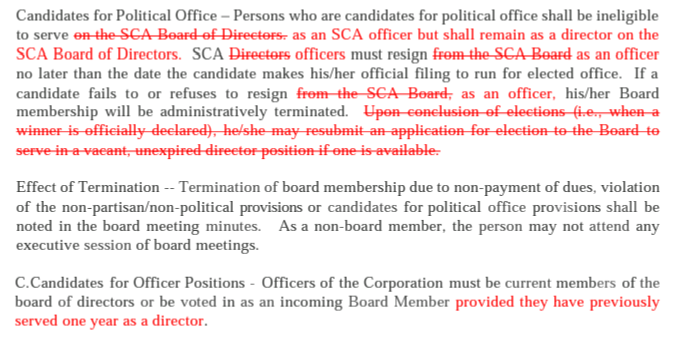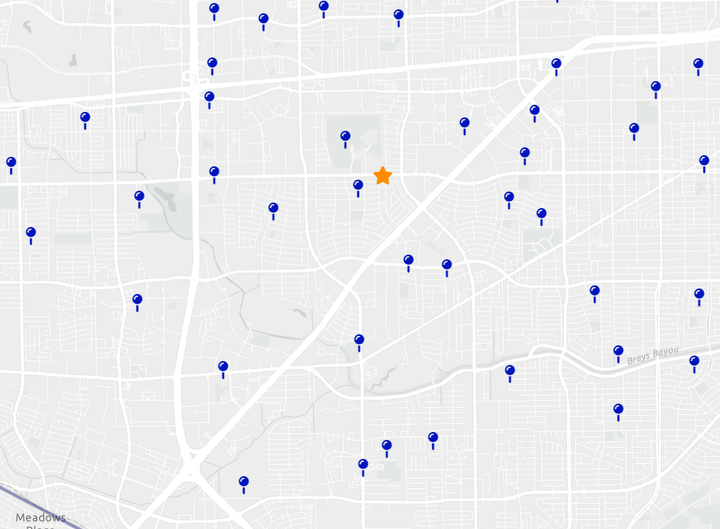Inside the Sharpstown Civic Association's Proposed Bylaw Changes

Note: Due to misleading language, this article was taken down on 8/24/23 at 10:19 AM and republished (in a corrected version) on 8/24/23 at 1:45 PM. See the bottom of the article for a list of corrections made.
On August 24 and September 28, dues-paying members get to vote on proposed changes to the bylaws of the Sharpstown Civic Association, which enforces deed restrictions and provides security for approximately 7,000 local homes.
If passed, the changes will affect the rules for electing board members and removing them before their terms end, among other things.
To become enshrined in the bylaws, the changes need to pass two separate votes, being affirmed by two-thirds of the eligible members present at each of the next two general meetings. The meetings will be held at Bayland Community Center at 6:30 PM.
Here’s how the proposed bylaws would differ from the current bylaws.
Multiplexes Included
The proposed bylaws state that owners or residents of "residential multiplexes" would be eligible to become members of the SCA. The current bylaws only mention “single family residences and residential duplexes.”
What are multiplexes? Many real estate websites describe them as multi-family homes with 2-4 separate living units (think of a duplex, triplex, or quadruplex). But the proposed SCA bylaws do not define multiplexes.
Could this allow apartment owners or renters to vote? Not likely. Section 5 of the SCA's bylaws specifically mentions that apartments and condominiums are excluded from the membership area. That rule would remain in the bylaws.
Nominating Committee Submits Candidate Lists to Members at Least Two Meetings before Elections
The proposed bylaws would require that, during board and officer elections, the nominating committee will submit “a final proposed list of directors and a final proposed list of officers” to the board.
If the board votes yes on the lists, they will be made available to the members “no later than two general meetings before the scheduled Annual Meeting.” Members will vote on directors (board members) and officers (president, vice-president, secretary, treasurer) during the annual meeting.
SCA board member Matthew Cowan, who worked on the bylaw changes, said that this is how elections have already been conducted since 2015 or 2016. Before then, nomination and voting all took place at the same meeting, which sometimes led to "acrimony," said Cowan.
Now, nomination and voting are split up "so when we come together in November, we can just vote and be done." The change would enshrine that practice in the bylaws.
Written Consent Required for Nominations
To nominate a board or officer candidate from the floor of a general meeting, members would need to present the candidate's written consent at the time of nomination.
A classic joke is that "it's always the person who doesn't show up to the meeting who gets nominated," said Cowan. This rule would exist to protect members from being volunteered for positions they don't want.
Candidates Required to Complete Applications
All candidates would be required to “complete an application.” The proposed bylaws do not say that an application can be denied by the board.
Cowan said, "It is not that they submit an application and we deny it... It doesn't work that way. Once they're nominated, and once they fulfill they requisites such as filling [out] the application, paying your dues...you're on the ballot." He said the application would ask candidates to state all potential conflicts of interest up front and remind them of some of the duties of board members and officers.
A candidate is allowed to complete the application after being nominated.
Officer Candidates Must Have Board Experience
To be a candidate for an officer position (president, vice-president, secretary, or treasurer), a member would need to have “previously served one year as a director” (a board member) at some point in their lifetime, even if they have not served on the board during the year leading up to the election.
Corporations Would Get Clearer Voting Rights
Can corporations really be members of the SCA? Well, the current bylaws state that household membership "may be determined by ownership of the property," and Houston Christian University owns many homes in the SCA's membership area.
But corporations' voting rights were unclear in the past because the bylaws only allow voting in person, yet forbid voting by proxy.
The proposed bylaws add the sentence, “Corporations who are members who are entitled to vote, may have a designated person to cast their ballot or ballots in person.” In other words, the prohibition against voting by proxy would not stop a corporation from sending an official representative to vote for it.
This would not give voting rights to businesses that are simply associate members. They are still forbidden from voting (Article III, Section 6, Subsection B).
Board Members Permitted to Run for Political Office
Board members would be allowed to run for political office without resigning from the board. Board officers (president, vice-president, secretary, and treasurer) would still need to resign from their officer positions to run for political office, but they could continue as board members. The current bylaws state, “Persons who are candidates for political office shall be ineligible to serve on the SCA Board of Directors.”
Board Members and Officers Could Be Removed by 2/3 of the Board Present at a Meeting
According to the proposed bylaws, “A director/officer may be removed from office, with or without cause, by a 2/3rds vote of Directors present at a regularly scheduled meeting. A 14-day written (mail or email) notice must be given to the director/officer in question.”
The current bylaws mention that board members can be removed, but don’t specifically describe the voting process. But the current bylaws do state, "Meetings shall be conducted according to the rules contained in the current edition of Robert's Rules of Order, Newly Revised to the extent to which such rules are applicable and are not inconsistent with or contradict the Corporation's bylaws, articles of incorporation or other special rules which the Corporation may adopt."
In other words, the bylaws aren't the only rules that govern the SCA. But what are Robert's Rules of Order, anyway?
It's actually the title of a widely used manual, originally written by U.S. Army brigadier general Henry Martyn Robert, who decided to create standardized rules for board meetings after trying to run a chaotic church meeting. Originally published in 1876 under the title Pocket Manual of Rules of Order for Deliberative Assemblies, it was later renamed to Robert's Rules of Order and is now in its twelfth edition.
Section 62 of Robert's twelfth edition contains a rule that is similar to the proposed new bylaw, but not quite the same. Here it is:
Except as the bylaws may provide otherwise, any regularly elected officer of a permanent society can be removed from office by the society’s assembly as follows:
If the bylaws provide that officers shall serve “for __ years or until their successors are elected,” the officer in question can be removed from office by adoption of a motion to do so. The vote required for adoption of this incidental main motion is (a) a two-thirds vote, (b) a majority vote when previous notice (as defined in 10:44) has been given, or (c) a vote of a majority of the entire membership—any one of which will suffice.
If, however, the bylaws provide that officers shall serve only a fixed term, such as “for two years” (which is not a recommended wording; see 56:28), or if they provide that officers shall serve “for __ years and until their successors are elected,” an officer can be removed from office only for cause—that is, neglect of duty in office or misconduct—in accordance with the procedures described in 63; that is, an investigating committee must be appointed, charges must be preferred, and a formal trial must be held.
In other words, Robert's Rules has two different processes for removing an officer: a board vote, or an investigation and formal trial. Which one currently applies to the SCA?
Possibly the second. According to Robert's Rules, a formal trial is required when an organization's bylaws "provide that officers shall serve 'for __ years and until their successors are elected," which is similar to the language in the SCA bylaws: "Officers...shall hold office for a one-year term and until their successors are duly elected and take office" (Article V, Section 2).
If the formal trial process is currently required, the proposed bylaw changes would eliminate it and make it easier to remove officers.
But if the first process applies instead, then Robert’s Rules already allows an officer to be voted off the island by a two-thirds majority of the board, even if that officer has not been warned of the vote in advance, or by a simple majority of the board if that officer has been warned in advance.
In that case, the SCA’s proposed bylaws would actually make it harder to remove an officer. The officer would be provided with at least fourteen days of warning no matter what, and a two-thirds vote would still be required—not just a simple majority.
Either way, if the proposed bylaw changes pass, they would override Robert's Rules.
Board Members Attend Meetings Faithfully or Risk Getting Kicked Out
Currently, a board member can be voted out for missing three regular board meetings in a row (“successive” meetings). In the proposed bylaws, the word “successive” has been removed, so board members can be voted out for missing any three regular board meetings, even if they are not back-to-back.
The proposed bylaws read “If any Director shall fail to attend the regular meetings of the Board for three (3) regular meetings he/she may be removed by a vote of the Board of Directors.” The same rule applies to officers.
Cowan said that the board has had problems with directors missing meetings before. Under the current bylaws, he said, a director could "conceivably miss half the year." The proposed bylaws would only allow a director to miss two meetings.
Some Awkward Grammar Changed
In Article IV, Section 3, the phrase “shall constitute not payment” would be changed to “shall not constitute payment.”
Committee Rules Added
The proposed Article IV, Section 10, Subsection A, “Purpose,” contains a grammatical mistake, but the intended meaning seems to be that "the Board of Directors/President" would have the ability to appoint committee members and remove them “with or without cause” (i.e. for any reason—or no reason).
Only SCA members could be appointed to committees, but any “member in good standing” would be eligible. Normally, committee terms would last one year.
Committees “can be created and appointed by the President or created by majority vote of the Board of Directors, which shall be appointed as per the motion creating the committee. If not specified then the default is the President appoints. The purpose and duties of each committee shall be set by the Board/President and may be modified or revoked at any time with or without cause. Chairmen of committees are either appointed by the President or via selection by the committee members.”
Some Committees Can Be Smaller
Board committees would require only “one or more” members instead of “two or more” members.
Wait, Did They Just Take That Whole Paragraph Out?
There are a few sections in the bylaws that look like they were removed at first glance, but they’ve just been moved to other parts of the document. If you really want to dive into the weeds, here are the reorganizations to look for:
- In Article III, Section 9, the original Subsection A got moved to Article IV, Section 10, Subsection C, Paragraph 2.
- In Article IV, Section 10 got renamed from “Delegation of Authority” to “Committees.”
- In Article IV, Section 10, Subsections A and B have been moved to Subsection D.
You can find a link to the proposed bylaws, including a redlined copy, here.
What do you think of the proposed bylaw changes? Please let us know by commenting below or emailing sharpstownsharpener@gmail.com!
Corrections and Other Edits:
- The section on multiplexes was edited to clarify that the proposed bylaws do not define multiplexes.
- The section on corporations' voting rights was edited to clarify that it applies to corporations, such as HCU, that own houses in Sharpstown--not to associate members.
- In the section on applications, the first paraphrase of Cowan was changed to a direct quote.
- The phrase "familiarize board members and officers with their duties" was replaced with "remind them of some of the duties of board members and officers."
- The original section on removal of board members strongly implied that the proposed bylaws would limit the board's powers and even stated, "The SCA’s proposed bylaws would actually make it harder to remove an officer." In reality, that may not be correct. The article has been updated to reflect the complexity of the interaction between the SCA bylaws and Robert's Rules.
- "Awkward Grammar Changed" edited to "Some Awkward Grammar Changed."
- "Committee Rules Revamped" edited to "Committee Rules Added."



Comments ()